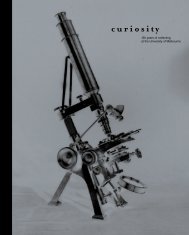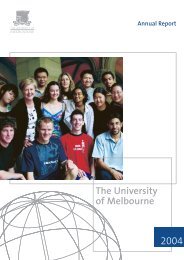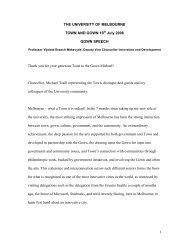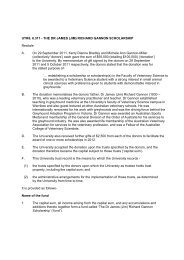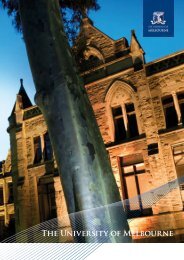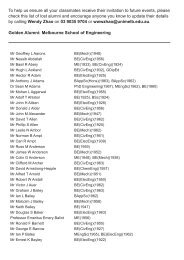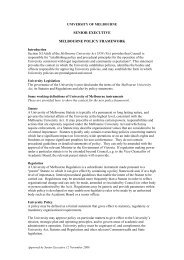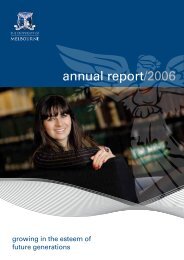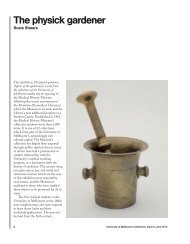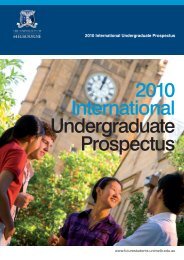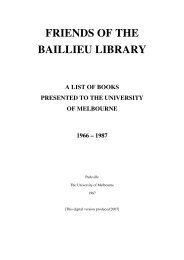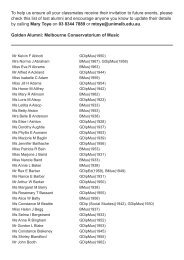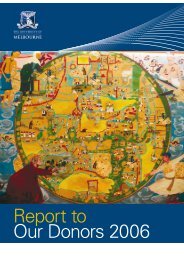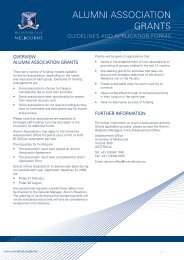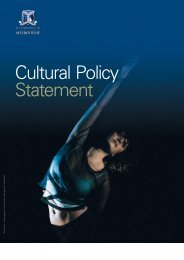music, visual and performing arts - University of Melbourne
music, visual and performing arts - University of Melbourne
music, visual and performing arts - University of Melbourne
Create successful ePaper yourself
Turn your PDF publications into a flip-book with our unique Google optimized e-Paper software.
Extra requirements<br />
The Bachelor <strong>of</strong> Music selection process<br />
requires applicants to pass an audition<br />
<strong>and</strong> complete a <strong>music</strong>ianship test. For your<br />
audition to be at a competitive st<strong>and</strong>ard,<br />
we recommend that the repertoire you<br />
present be at the equivalent st<strong>and</strong>ard <strong>of</strong><br />
Grade 7 AMEB (Grade 8 ABRSM) on your<br />
instrument or Grade 5 AMEB for voice.<br />
Audition: Live auditions are usually<br />
held in November <strong>and</strong> early December.<br />
Applicants from overseas, interstate or<br />
regional Victoria should submit an audition<br />
recording in CD audio format.<br />
For your audition, you should prepare<br />
three pieces demonstrating your skill on<br />
Choose Music at <strong>Melbourne</strong><br />
As a Bachelor <strong>of</strong> Music student at the<br />
<strong>University</strong> <strong>of</strong> <strong>Melbourne</strong> you will benefit<br />
from:<br />
> a highly flexible new generation degree,<br />
tailored to meet your interests, skills <strong>and</strong><br />
needs in preparation for your future life in<br />
<strong>music</strong><br />
> a degree delivered by a prestigious<br />
institution with a reputation for producing<br />
outst<strong>and</strong>ing graduates for careers in all<br />
aspects <strong>of</strong> the <strong>music</strong> pr<strong>of</strong>ession, <strong>and</strong><br />
especially performance, composition,<br />
<strong>music</strong>ology <strong>and</strong> ethno<strong>music</strong>ology<br />
> an extensive practical program, <strong>of</strong>fering<br />
one-to-one instrumental/vocal tuition, <strong>and</strong><br />
regular masterclasses with national <strong>and</strong><br />
international visiting artists<br />
> a comprehensive <strong>and</strong> <strong>music</strong>ally<br />
stimulating suite <strong>of</strong> ensemble<br />
opportunities, from chamber to large<br />
orchestra, <strong>and</strong> across all genres <strong>of</strong> <strong>music</strong>,<br />
including many types <strong>of</strong> instrumental,<br />
early <strong>music</strong> <strong>and</strong> vocal ensembles<br />
> exciting opportunities for specialisation<br />
in early performance practice,<br />
contemporary performance, non-western<br />
ensembles (e.g. Javanese Gamelan),<br />
contemporary ensembles (e.g. Big B<strong>and</strong>),<br />
Wind Ensemble, World Music Choir,<br />
<strong>and</strong> many other formal <strong>and</strong> informal<br />
performance opportunities<br />
> a diverse student body, selected from<br />
all Australian states, with 15 per cent <strong>of</strong><br />
students coming from abroad<br />
> a student support network including an<br />
extensive orientation program, Mentor<br />
<strong>and</strong> Transition Program, Piano at Home<br />
Scheme, easy access to staff, state-<strong>of</strong>the-art<br />
computer facilities, 24/7 practice<br />
facilities <strong>and</strong> student groups<br />
> a lively concert life, with regular lunchtime<br />
<strong>and</strong> evening concerts by students,<br />
pr<strong>of</strong>essionals, <strong>and</strong> visiting artists.<br />
the instrument you wish to study. The<br />
pieces should be <strong>of</strong> contrasting styles <strong>and</strong><br />
periods, <strong>and</strong> the audition program should<br />
be no longer than 20 minutes.<br />
A sample program might include works<br />
from the Baroque, Romantic <strong>and</strong> 20th<br />
century repertoires. You may also be<br />
asked to demonstrate some technical<br />
work.<br />
The audition panel will not hear your entire<br />
program <strong>and</strong> will make its own selection<br />
from the works prepared.<br />
Musicianship test: The <strong>music</strong>ianship<br />
test assesses your aural <strong>and</strong> theory<br />
skills, which is used to design a first-year<br />
course structure tailored to meet your<br />
Course structure<br />
First year: focuses on performance/<br />
composition skills, historical, theoretical<br />
<strong>and</strong> contextual studies, aural studies <strong>and</strong><br />
applied <strong>music</strong> skills.<br />
Second <strong>and</strong> third years: Specialised study<br />
intensifies while the flexibility <strong>and</strong> capacity<br />
for you to move between specialisations<br />
<strong>and</strong> keep your graduate study options open<br />
is retained.<br />
You can select from a wide range<br />
<strong>of</strong> electives across various <strong>and</strong><br />
interchangeable categories, for example<br />
Applied Skills electives, which include<br />
ensemble subjects, Academic electives<br />
<strong>and</strong> Music Studies electives. Electives are<br />
<strong>of</strong>ten selected based on relevance to your<br />
particular specialisation.<br />
A breadth subject is also taken in each<br />
semester <strong>of</strong> enrolment.<br />
Depth – developing your<br />
specialisation<br />
You may choose to focus your studies in<br />
one <strong>of</strong> the following areas <strong>of</strong> specialisation:<br />
> Performance<br />
> Composition<br />
> Musicology<br />
> Ethno<strong>music</strong>ology<br />
There is flexibility to move between<br />
Performance <strong>and</strong> Composition<br />
specialisations from first <strong>and</strong> second<br />
year. Specialisation in Musicology <strong>and</strong><br />
Ethno<strong>music</strong>ology commences in second<br />
year, with the flexibility to combine these<br />
specialisations with further Performance<br />
study.<br />
specific needs. The test is held three<br />
times during the live audition period <strong>and</strong><br />
for those that audition via recording,<br />
again in the orientation period, prior to the<br />
commencement <strong>of</strong> classes.<br />
Instrument: You need to confirm that<br />
your instrument is one in which tuition is<br />
available.<br />
If you are advanced on two instruments,<br />
<strong>and</strong> are unsure on which instrument to<br />
specialise, you are welcome to audition for<br />
both instruments.<br />
For more information see:<br />
www.bmus.unimelb.edu.au/apply<br />
There is a wide range <strong>of</strong> electives to<br />
complement your area <strong>of</strong> specialisation<br />
which are available across all<br />
specialisations:<br />
Applied Skills electives encompass our<br />
ensemble program <strong>and</strong> include Computing<br />
for Musicians <strong>and</strong> Music Technology<br />
(popular with composition students), Art <strong>of</strong><br />
Piano Teaching (for piano students), <strong>and</strong><br />
Language <strong>and</strong> Diction (for singers), plus a<br />
host <strong>of</strong> other subjects such as Improvisation<br />
Techniques, Afro American Percussion<br />
Ensemble, <strong>and</strong> Improvisation Vocal<br />
Ensemble, all <strong>of</strong> which are designed to<br />
extend students’ <strong>music</strong>al expertise in ways<br />
that will help broaden <strong>and</strong> shape their future<br />
<strong>music</strong>al careers.<br />
Academic Electives include subjects<br />
such as Art Music <strong>and</strong> Postmodernism;<br />
Broadway <strong>and</strong> the Music <strong>of</strong> the Theatre;<br />
Music <strong>of</strong> the World; Music <strong>and</strong> Film; Music<br />
Criticism; Notation <strong>and</strong> Music Editing;<br />
Paris! Berlioz to the Ballets Russes;<br />
Ragtime to Rap: Popular Music since 1900;<br />
Composition for Film; Chamber Music<br />
(Style <strong>and</strong> Context); History <strong>of</strong> Australian<br />
Improvised Music; Jazz History; Romantic<br />
Piano Music; Sex, Death <strong>and</strong> the Ecstatic in<br />
Music; Stravinsky <strong>and</strong> the Music <strong>of</strong> the 20th<br />
Century; <strong>and</strong> Studies in Opera<br />
Music Studies electives include Music<br />
Psychology; Pop Song Writing; Indigenous<br />
Music <strong>and</strong> Culture; Arts Management;<br />
Music <strong>and</strong> Health; Composition Studies;<br />
Music Analysis <strong>and</strong> Historical Performance<br />
Practice; <strong>and</strong> Career Preparation in Music;<br />
which <strong>of</strong>fers work experience in fields such<br />
as concert management, <strong>music</strong> retail,<br />
sound recording, <strong>arts</strong> administration, <strong>and</strong><br />
instrument making/repair, with opportunities<br />
available across over 40 different<br />
organisations.<br />
21



